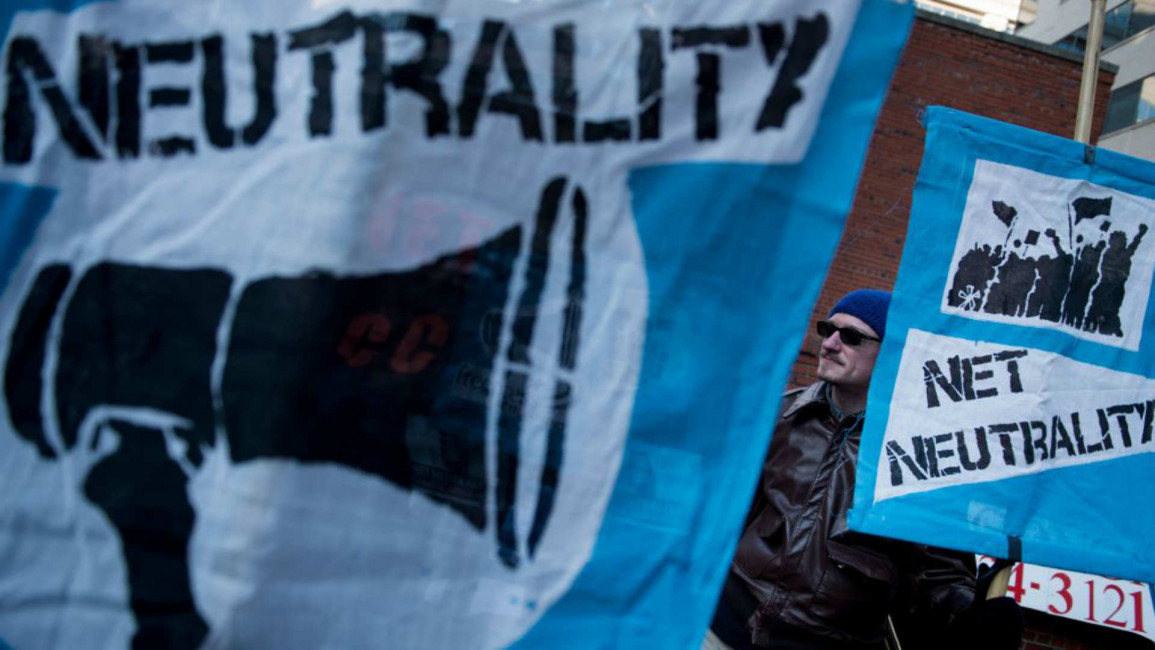
What does loss of US net neutrality mean for the Arab world?
These rules, created through the 2015 Open Internet Order, required internet service providers to treat all internet traffic equally and not favour some data streams over others. For instance, a provider cannot charge customers for quicker access to a video platform, or slow down other services if the customer does not pay up.
Junking the rules effectively gives US-based corporations free rein to monetise and control what users see and do online. But what does this mean for the Arab world?
A history of blocking content, now legitimised
The precedent the FCC sets is particularly dangerous for the Arab world. Internet users in the Middle East and North African countries are no strangers to blocked online content.
For example, under the guise of anti-competition regulations, Voice over Internet Protocol (VoIP) services are blocked by governments in a handful of Arab countries such as Saudi Arabia and temporarily in 2017, Egypt.
In Tunisia in 2014, news circulated claiming that the country's major telecommunications operators were planning a proposal to limit access to VoIP services. Under the proposal, access to VoIP services would be exclusively limited to postpaid or professional plans.
Luckily, the National Telecommunications Authority publicly opposed any such plan and affirmed a commitment to net neutrality, stating that it will make sure that telcos respect their obligation toward net neutrality.
 |
The vast majority of Arab countries do not have legislation protecting the neutrality of the net |  |
But what about other countries whose regulators do not engage in similar commitments?
The reality is that the vast majority of Arab countries do not have legislation protecting the neutrality of the net and ensuring equal access. On our side of the world, internet users may be faced with local regulators who choose to follow the footsteps of the US FCC, and opt to explicitly favour the business interests of the telecommunications industry over those of all users.
This is especially troublesome given that most governments in the Arab world have direct access to control traffic flow: The majority mobile network operators in the region are partially if not totally state-owned, with little independent regulatory oversight. If anything, the FCC's decision to favour business interests over users only legitimises the actions of Arab governments in doing the same.
Widening access gaps
In 2017, the penetration of internet users in the Arab region reached 42 percent of the total population, and by 2020, it is projected that one in every two Arabs (or around 49 percent of the population) will be using the internet.
However, higher figures are seen in the richer countries such as Qatar, Bahrain and the UAE. Connectivity and access across the majority of the region remain closely linked with socioeconomic status and wealth.
Twitter Post
|
The FCC's decision only exacerbates these gaps. In the absence of net neutrality rules, telcos are incentivised to provide expensive and low value access; a pay-to-play walled garden that only grants access to clients who can afford to do so.
This goes against a principle upon which the internet was built: That once you have access to it, it is an open space. There are no gatekeepers.
By actively blocking access to specific content and applications through commercial discrimination, telcos greatly harm innovation by reducing opportunity for users.
This is especially regrettable in relation to budding SMEs in the region who rely heavily on an open and free web to do their work and improve people's lives.
The importance of a regulatory framework
Still, the truth is that telcos will behave according to the regulatory framework they operate within.
For example, since 2015 in the European Union, internet service providers have been legally obliged to respect net neutrality rules. Prior to the adoption of binding legislation, internet users in the EU were increasingly experiencing network discrimination.
Twitter Post
|
An investigation by the Body of European Regulators of Electronic Communications (BEREC) found that roughly 20 percent of EU internet user contracts allowed for ISP restriction of services such as Voice over IP such as Skype or Viber, and peer-to-peer.
That is no longer the case after the European Union enshrined the principle of net neutrality in its legal framework by prohibiting operators from blocking, throttling, or discrimination of online content, applications and services.
Yet, some of those very same operators to behave differently in the Arab world, where blocking of services and applications is frequent.
While the FCC's decision may certainly legitimise commercial discrimination by telcos in the Arab world, it is not the be-all and end-all.
Government officials and telecom regulators can choose to favour the interests of users in promoting an open internet that brings economic and social benefits to all.
Already, India, the world's second largest internet user base, had its telecom regulator re-affirm its support for net neutrality regulation and recommend amendments to operator licenses in order to prevent technical forms of network discrimination.
Legal obligations must be in place to frame the way in which operators do business. Governments will have to consider creating and implementing rules to protect equal access to the web, and civil society must lead the fight to ensure net neutrality in the Arab world.
Wafa Ben Hassine leads Access Now's policy and advocacy efforts in the MENA region. She is an expert in the intersection of digital rights, technological developments, and international human rights law.
Follow her on Twitter: @ousfourtia
Opinions expressed in this article remain those of the author and do not necessarily represent those of The New Arab, its editorial board or staff.




